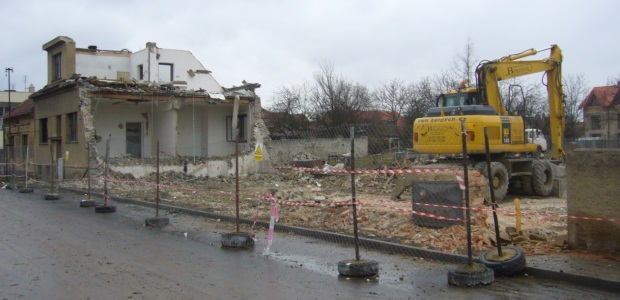
Unhošť municipal representatives Mr. Karel Kopp and Ms. Iveta Koulová meet with Petr Leyer from Transparency International Czech Republic in front of the new leisure facility.
Unhošť is a small, sleepy town about 20 kilometres from Prague’s city centre – home to around 3,500 inhabitants. Normally, this is a peaceful place, but a controversy a few years ago has taken its toll on the community.
It all began when a newly elected politician decided to look into the town’s finances. He soon discovered some questionable spending, but speaking out about it and getting authorities to take action proved an uphill battle.
Raising the alarm
The politician, Karel Kopp, first approached us in 2011. Back then, he was a newly elected representative for the municipality. Upon entering political office, he was keen to make sure the town’s funds were being spent responsibly. While he was looking through procurement records, his suspicion was raised when he found irregularities in how money was spent on a certain construction project. In fact, it seemed the work done was in violation of the law. Yet, when he tried to raise the alarm internally, he was blocked by certain colleagues, including the mayor. This led him to our doors.
Officials above the law?
The case concerned a decision by municipal leaders to demolish an old leisure facility and build a new one. To outsource the work, they invited several local construction companies to submit tenders for the contract.
The problem, Kopp said, was that no-one checked if the winning price for the demolishment of the old leisure facility actually provided good value. Despite a law stipulating that they needed to compare the price against market-related prices, none of the politicians seemed concerned to check whether public money was being wasted on inflated bids.
If this seems like a small matter, it’s worth remembering the bigger context. More than 50 per cent of citizens in Czech Republic think that business is corrupt, and almost three-quarters think the same about government officials and politicians. If no-one’s checking the real value of contracts between business and officials, there’s the risk of ramped-up pricing and kick-backs. The business wins, so does the official – but the public loses out.
In the case of the leisure centre, it seemed the costs were well above their actual worth. Kopp claimed that, as a result of this negligence, as much as 4.5 million Czech Koruna (€160,000) had been wasted during the demolishment work – money that could have been used to improve daily life for the people of Unhošť.
Kopp even sought an opinion from an expert advisory company from the construction field, which supported his claims, yet some of his other colleagues still refused to support him in initiating an internal investigation. That’s when he came to us for help.
Fighting for change
We took the case on immediately, and started working to secure an investigation. We gathered photographic documentation of the case, spoke with experts, and shared our concerns with the Ministry of Finance.
Like Kopp, we faced obstacles in the town. First, we had to battle against officials who were demanding extortionate fees in return for releasing public information. Then, after we successfully lodged a criminal complaint against the former mayor for neglecting his duties, we received news that the investigation had been suspended by the police.
But we did not give up our struggle. We took our complaint to the Supreme Prosecutor, who after reviewing the case decided to reopen criminal investigations. He also said he was willing to be involved in ongoing discussions with us about wider procurement issues, indicating real interest in change.
The fight to uphold the law is not over yet, but we’re getting closer. This case has revealed worrying gaps in the enforcement of legislation that controls public spending. With public money being limited, it’s vital that procurement law is respected so that funds are spent responsibly and benefit the projects for which they are intended.
Carousel image: Transparency International Czech Republic
















 Connect with us on Facebook
Connect with us on Facebook Follow us on Twitter
Follow us on Twitter